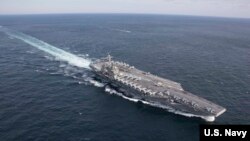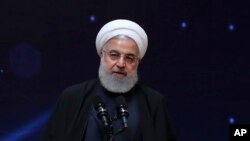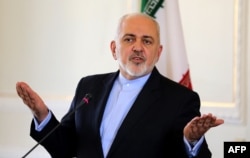The USS Abraham Lincoln aircraft carrier strike group and four B-52 bombers have arrived in the Middle East in response to concerns Iran may be planning an attack against American targets.
The carrier strike group completed its transit Thursday through the Suez Canal, U.S. Central Command spokesman Navy Capt. William Urban told VOA. He said two B-52 bombers arrived in the region Thursday, while two others arrived Wednesday.
The bombers are now at Al Udeid Air Base in Qatar, a defense official confirmed on condition of anonymity.
The request for more military assets in the Middle East was "in direct response to a number of troubling and escalatory indicators and warnings" from Iran, CENTCOM commander Marine Gen. Kenneth "Frank" McKenzie Jr. said Wednesday in Washington.
Air Force Chief of Staff Gen. David Goldfein told VOA the swift military movement "sends a message that we can face any threat at a time and place of our choosing."
The American military arrived in the Middle East as European leaders denounced threats from Iran to stop curbing its nuclear program, a move that would breach a landmark global agreement.
Hours before new sanctions were imposed Wednesday by the United States, President Hassan Rouhani said Iran would enrich uranium beyond allowable limits if world powers didn't protect Iran from the sanctions within 60 days.
"We reject any ultimatums and we will assess Iran's compliance on the basis of Iran's performance regarding its nuclear-related commitments," the European Union and the foreign ministers of Britain, France and Germany said Thursday in a joint statement.
The European leaders also said they wanted to preserve the 2015 agreement, which requires Iran to curb its nuclear program in exchange for the elimination of sanctions. The deal was signed by China, Britain, France, Germany, Russia, the U.S. and the EU. The U.S. abandoned the agreement one year ago.
Despite the U.S. withdrawal, President Donald Trump introduced new sanctions Wednesday on Iranian metal exports, major sources of revenue for the country. The U.S. had previously slapped sanctions on Iranian oil, which have devastated its economy.
The sanctions have created a quandary for Washington's European allies, which have said they share concerns about Iran's behavior but believe Trump's strategy will most likely backfire.
The allied nations are also opposed to Trump's abandonment of the nuclear pact, contending it emboldens Iranian hard-liners and undermines pragmatists who want to ease the country's isolationist approach.
Iranian Foreign Minister Mohammad Javad Zarif reacted to the European leaders on Twitter:
Earlier Thursday, Iran's Atomic Energy Organization said Tehran's goal was to bring the agreement "back on track." But Tehran has also said it will leave the agreement, the Joint Comprehensive Plan of Action, unless it gets more economic support.











